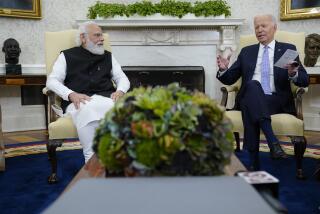China Lags in Openness Sweepstakes
- Share via
BOLINAS, CALIF. — Andrei Sakharov’s recent travels in the United States marked a new high-water mark for Soviet glasnost , also allowing an interesting comparison between the reform programs of the Soviet Union and the People’s Republic of China. Having competed bitterly in the past for the mantle of Marxist purity, these two socialist leviathans now find themselves in the anomalous position of contending for the title of being most reform-minded and most open to the outside world.
While changes in China’s economic system have far outpaced anything Mikhail S. Gorbachev has been able to accomplish, Chinese leadership has showed much more reticence about democratic reforms in the political process and liberalizing policy toward intellectuals. In fact, just as Sakharov received permission to come to the United States, astrophysicist Fang Lizhi, one of the China’s most eminent scientists, a fearless advocate of democracy and human rights, had his permission to leave China cancelled.
Fang, dubbed “China’s Andrei Sakharov” by Western diplomats and journalists in Beijing, was due in the United States late this month to attend an astrophysical conference in Texas then to spend six months in residence at the Colorado Joint Institute for Laboratory Physics and several weeks as a visiting scholar at UC Berkeley.
Long a thorn in the side of the Chinese Communist Party because of a penchant for speaking his mind, Fang, like Sakharov, has repeatedly been harassed and persecuted. Even after spending years in forced exile following the Anti-Rightist Campaign of the late 1950s and being labeled a reactionary during the Cultural Revolution, Fang became more vociferous than ever in the 1980s. Two years ago he toured Chinese university campuses declaring publicly that socialism had been a failure and urging Chinese youth to speak out for their democratic rights. When students later demonstrated all across China, Fang was not only expelled from the party, but fired from his job as vice president at the prestigious University of Science and Technology.
Still, he continued to speak out publicly, often saying things few other Chinese dared utter. While in Hong Kong this past summer, for instance, Fang claimed that some sons and daughters of China’s highest ranking party officials had used family positions to profiteer, even to set up private foreign bank accounts abroad. Since it was no longer possible to threaten Fang with party expulsion or loss of job, Fang’s previously approved exit visa for the U.S. visit was cancelled by the Chinese Academy of Sciences. In a letter explaining his forced change of plans to the physics department at Berkeley, Fang bluntly termed the about-face as “completely political” in motivation.
The sudden revocation of Fang’s permit sets back the party’s own announced goal of promoting scientific exchange with the outside world; it also puts China in the inglorious position of seeming to be bypassed by the Soviet Union in what has unexpectedly shaped up as a kind of openness sweepstakes. Until the proclamations of glasnost and perestroika by Gorbachev, Deng’s China was far ahead.
With Fang’s grounding, however, just as Sakharov was granted permission to go, the world is reminded of the limited nature of China’s democratization. We are also reminded how fragile the reform programs of men like Gorbachev and party General Secretary Zhao Ziyang are when they face opposition from entrenched party factions that remain so deeply ambivalent about too much openness.
And just now, with spiraling inflation, growing worker unrest and increasing official corruption--plus the fresh memory of mass student demonstrations--China’s conservatives, headed by Premier Li Peng, have come into ascendancy over the more reform-minded Zhao.
Such an unstable situation puts a special burden on those of us in the West who are able to speak out and who purport to be concerned about international human rights. While our government, President Reagan included, has been outspoken about abuses in the Soviet Union and Eastern Bloc countries, there has been no such ardor about criticizing China for similar abuses.
But just as such dissident thinkers as Sakharov relied heavily on supporters in the West to keep their names in the public eye during their past times of travail, so men like Fang Lizhi derive an important measure of protection from people and organizations abroad who are willing to call the world’s attention when the Chinese leadership abridges rights of travel and free speech.
In this sense, “China’s Sakharov” does not quite fit Fang. For while he has been no less outspoken in his defense of free expression, there has been much less concern evinced in the West over the fate of Fang and his cohorts. When his exit permit was cancelled without explanation, there was little mention in the U.S. press, barely a ripple of protest among fellow American intellectuals and no meaningful public response from the U.S. government--all of which suggests that when it comes to support for international human rights, the United States has different sets of standards for different parts of the world.
More to Read
Sign up for Essential California
The most important California stories and recommendations in your inbox every morning.
You may occasionally receive promotional content from the Los Angeles Times.










